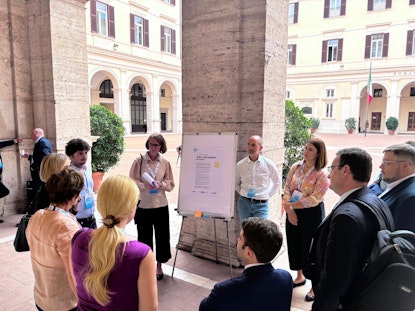A new era of procurement in Europe: Time for bold change

Last week in Rome, we brought together over 100 leaders from 26 European governments, EU institutions, global organizations like the World Bank, OECD, EBRD, and UNOPS, civil society, and the private sector for the 3rd International Open and Sustainable Public Procurement Conference 2024. Huge thanks to our amazing hosts: Italy’s Autorità Nazionale AntiCorruzione, who went the extra mile to make the meeting fun, engaging, and a great success, shaping a powerful collective vision for the next generation of procurement reforms in Europe. Appreciation also to Albania’s Public Procurement Commission, which helped a sizable Western Balkan community to participate energetically.
With its mix of charm, history, and major public works set to transform its infrastructure for the future, Rome was the perfect backdrop for our event which was all about harnessing our collective knowledge to make procurement more results-driven, transparent, and impactful across Europe.
Key takeaways
- Momentum for transformation: The next few years could redefine public procurement across the continent. We have the widespread roll out of Europe’s new e-forms, the launch of the Public Procurement Data Space, and a review of the Open Data Directive to include – hopefully – procurement as a high-value dataset across Europe. We also have a new Commission and a new parliament, as well as wider soul searching on the continent’s economic competitiveness. All this will likely lead to revised public procurement directives.
- The lost decade: EU Auditor Helga Berger painted a sobering picture: we’ve lost a decade of progress in European procurement despite 2014 Directives. Between 2011 and 2021, single bids doubled, the number of bids halved, and direct awards surged. This trend started long before Covid.
- Price is what you pay, value is what you get: Some 80% of procurement decisions in Europe are done solely on lowest price. Who bears the costs of lowest prices? As the University of Nottingham’s Anna Maria La Chimia pointed out, it’s often workers on insecure, zero-hours contracts. As a reform community, we agreed that we need to focus more on long-term value, with sustainability, social value, and innovation becoming increasingly important and that contract management is where this value is often won or lost. We also reflected that there may be trade-offs between these objectives that we need to manage with an eye to longer-term value and looking across the whole supply chain: there is no point buying solar panels to go green, if they are being made with slave labour.
- Independent complaint authorities: Not everything has gone backwards over the last decade. One positive development has been the way that resolving procurement complaints has moved from being an internal, compliance-focused function to being handled by independent institutions focused on protecting competition and fairness. There was a real energy around further reforms and digitalisation, especially across the new Network of Public Procurement Review Bodies of South Eastern Europe.
- Shifting mindsets: As Jonaid Myzyri, Chair of Albania’s Public Procurement Commission told us of his powerful reforms: “Change was not about the technology, it was about shifting mindsets”. By becoming more open and transparent, the Commission ensures that the public directs its criticism at bad procurement practices, not at how complaints are handled.
- Data drives everything: Systems with better structured and more accessible data, better data coverage, and enhanced interoperability are the key to success in procurement, especially as we move into a digital age. AI, LLMs, machine learning, smart contracts and other technologies can revolutionise procurement, but only if we have the right data to support it. Data-powered red flags strengthen efforts to fight corruption. Europe’s upcoming Anti-Corruption Directive, with a new focus on prevention, could be a significant mandate to improve procurement data quality. We’re ready to help make this happen.
Next steps
- Launching our Vision Declaration: One thing was clear to all of us: good procurement goes beyond regulation and reporting. It’s about creating long-lasting, sustainable, and inclusive value for people and communities. Through better data, digitalisation, and new technologies, we can make procurement more efficient, transparent, user-friendly, and socially impactful. This was a key takeaway for our collective Vision Declaration from the event, which outlines some of the key principles that should guide the next generation of procurement in Europe. The Declaration is still open for feedback, so we invite you to contribute by sending an email to kgranickas@open-contracting.org.
- Expert feedback group: OCP is committed to responding to the call for cross-sector collaboration. We’re forming a stable group of procurement leaders to ensure that the principles in our Vision Declaration are reflected in the EU’s revised procurement directives. Watch this space!
- LinkedIn group for the community: To keep the conversation going, we’ve launched a LinkedIn group. It will be a hub for procurement professionals to share ideas, collaborate, and drive innovation. Join us!
- Learning from each other: One of the event’s core messages was that while individual countries are leading with innovative approaches, we can—and must—do more to learn from one another and make Europe’s reforms more systemic and substantial overall. To address this, ANAC’s Giuseppe Busia and IMPIC’s Isabel Da Rosa announced the creation of a new network of public procurement supervision bodies to help the EU shape procurement for the new era. Meanwhile, the European Commission is recommissioning an expert group on eProcurement group, which will be especially tasked with providing expert feedback to the Commission on rethinking the Directives where we hope that our combined vision and experience can also be shared.
We left Rome with a wealth of actionable insights and a renewed sense of purpose in advancing better procurement practices in Europe: collaboration and innovation will play critical roles in shaping the next generation of innovation that our continent needs. Thanks for reading and stay informed on the next steps by signing up for our Europe newsletter.